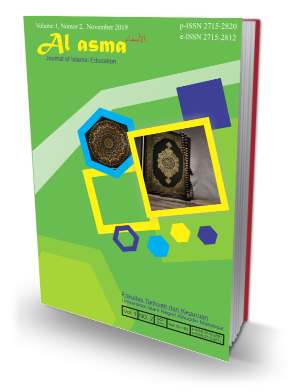PENGEMBANGAN LKPD BIOLOGI MATERI EKOSISTEM SEBAGAI MEDIA PEMBELAJARAN KELAS X MA MADANI ALAUDDIN PAO-PAO
Abstract
Abstrak
Penelitian ini dilakukan dengan tujuan untuk mengembangkan Lembar Kerja Peserta Didik pada materi ekosistem serta untuk mengetahui kevalidan Lembar Kerja Peserta Didik, mengetahui respons peserta didik terhadap Lembar Kerja Peserta Didik, dan mengetahui keefektifan Lembar Kerja Peserta Didik yang dikembangkan. Dalam penelitian ini penulis menggunakan model pengembangan 4-D, yang meliputi empat tahap yaitu pendefinisian (define), perancangan (design), pengembangan (develop), dan penyebaran (disseminate). Subjek penelitian ini adalah peserta didik kelas X MIA 2 MA Madani Alauddin Pao-Pao sebanyak 38 peserta didik. Instrumen penelitian yang digunakan adalah lembar validasi, angket respons peserta didik, dan tes hasil belajar. Teknik pengolahan dan analisis data yang digunakan adalah analisis data kevalidan, analisis data respons peserta didik, dan analisis data keefektifan. Berdasarkan penilaian dari validator ahli, tingkat kevalidan Lembar Peserta Didik yang diperoleh pada penelitian ini yaitu sangat valid dengan nilai rata-rata akhir 3.72, sedangkan berdasarkan angket, respons peserta didik yang diperoleh adalah positif karena diperoleh hasil rata-rata respons peserta didik yaitu 2.95 sehingga produk baik untuk digunakan, sedangkan pada tingkat keefektifan berdasarkan hasil tes peserta didik, diperoleh persentase ketuntasan belajar peserta didik sebanyak 92%, yang menunjukkan bahwa Lembar Kerja Peserta Didik efektif untuk digunakan.
Abstract
The purpose of this study was to develop student worksheets on ecosystem material and to determine the validity of student worksheets, find out the responses of students to the student worksheets, and find out the effectiveness of the student worksheets developed. This research and development refers to the 4-D development model, which includes four stages, namely defining, designing, developing, disseminating. The subjects of this study were class X MIA 2 MA Madani Alauddin Pao-Pao students as many as 38 students. The research instruments used were validation sheets, student response questionnaires, and learning outcomes tests. Data processing and analysis techniques used are validity data analysis, analysis of student response data, and effectiveness data analysis. Based on the assessment of the expert validator, the level of validity of the student worksheets obtained in this study is very valid with a final average value of 3.72. While based on the questionnaire, the responses of students obtained are positive because the results of the average response of students are 2.95 so that the product is good to use. While at the level of effectiveness based on the test results of students, the percentage of students' learning completeness was 92%, which showed that the student worksheets was effective to use.
Downloads
References
Desmiwati, R.R. & Yulkifli. (2017). Validitas LKPD Fisika SMA Menggunakan Model Problem Based Learning Berbasis Teknologi Digital. Retrieved from http://www.jurnalmahasiswa.unesa.ac.id/article26135464/364/article.pd
Hasbullah, (2009). Dasar-Dasar Ilmu Pendidikan. Jakarta: PT. Raja Grafindo Persada.
Juanda, A. (2015). Profesionalisme Mahasiswa Biologi Mengintegrasikan Pelajaran Biologi dengan Agama Islam, Retrieved from https://www.syekhnurjati.ac.id/jurnal/index.php/sceducatia/article/view/483
Merdekawati, S., & Lestari, H. P. (2011). Developing Student Worksheet In English Based On Constructivism Using Problem Solving Approach For Mathematics Learning On The Topic Of Social Arithmetics. International Seminar and the Fourth National Conference on Mathematics Education 2011 Department of Mathematics Education, Yogyakarta State University, 978–979.
Nahdaturrugaisiyah. (2017). Pengembangan Media Pembelajaran Berbasis Flash Pada Pokok Bahasan Sistem Organisasi Kehidupan Siswa SMP Negeri 24 Makassar, (Skripsi tidak diterbitkan). Universitas Islam Negeri Alauddin Makassar, Makassar.
Nissa, L.H. & Sukardiyono. (2017). Pengembangan LKPD Fisika Dengan Strategi Pembelajaran Induktif Untuk Mengukur Keterampilan Berfikir Kritis Siswa, Retrieved from http://www.jurnalmahasiswa.unesa.ac.id/article26135464/364/article.pd
Ridwan. (2003). Skala Pengukuran Variable-Variabel Penelitian Cet. Kedua. Bandung: Alfabeta.
Sari, A.P.P. & Agil L. (2016). Pengembangan Lembar Kegiatan Peserta Didik (LKPD) Berbasis Scientific Approach Siswa Sma Kelas X Pada Materi Fungi, Retrieved from http://fkip.ummetro.ac.id/journal /index.php/biologi/article/view/489
Sugiyono, (2013). Metode Penelitian Pendidikan Pendekatan Kuantitatis, Kualitatif dan R&D. Bandung: Alfabeta.
Sumarmi, Wiwik S.U., I. Nyoman R., dan Sugeng U., (2016). The Effectiveness of Geography Student Worksheet to Develop Learning Experiences for High School Students, Retrieved from http://files.eric.ed. gov/fulltext /EJ1111407.pdf
Undang-Undang Republik Indonesia Nomor 20 Tahun 2003 Tentang Sistem Pendidikan Nasional.
Widyoko, S. Eko Putro. (2014). Evaluasi Program Pembelajaran Panduan Praktis Bagi Pendidik dan Calon Pendidik. Yogyakarta: Pustaka Pelajar.
Yusuf, N. (2010). Perspektif Islam tentang Pengintegrasian Ilmu Akhlak dalam Pembelajaran Ilmu Sains dan Penerapannya di Lembaga Pendidikan Islam, Retrieved from https://www.ejournal.uinsuska.ac.id/indeks.php/Kutubkhanah/article/download/404/386
- Authors retain copyright and grant the journal right of first publication with the work simultaneously licensed under a Creative Commons Attribution License that allows others to share the work with an acknowledgement of the work's authorship and initial publication in this journal.
- Authors are able to enter into separate, additional contractual arrangements for the non-exclusive distribution of the journal's published version of the work (e.g., post it to an institutional repository or publish it in a book), with an acknowledgement of its initial publication in this journal.
- Authors are permitted and encouraged to post their work online (e.g., in institutional repositories or on their website) prior to and during the submission process, as it can lead to productive exchanges, as well as earlier and greater citation of published work (See The Effect of Open Access).

